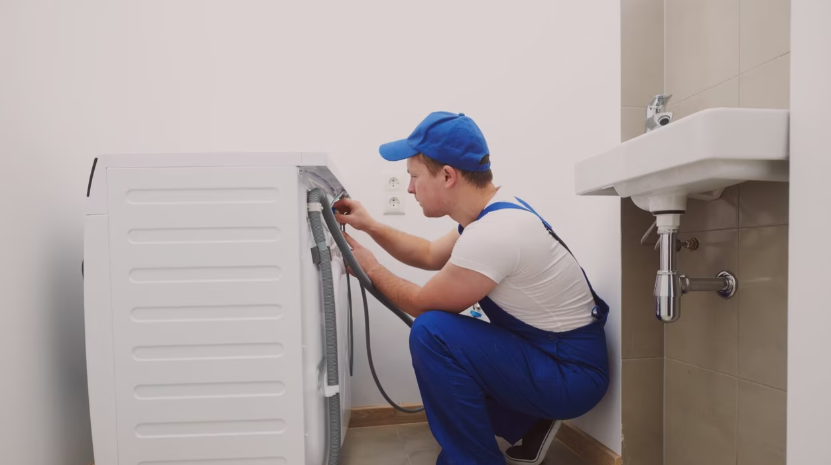
Why Your Washer Smells Bad—and How to Fix It
There’s nothing quite like the fresh scent of clean laundry—unless your washer smells like mildew, rotten eggs, or something sour. If you’ve ever opened your washing machine and been hit with an unpleasant odour, you’re not alone. A smelly washer is a common issue that can affect both top-load and front-load machines, and it can quickly turn your laundry experience into a frustrating one.
But here’s the good news: with the right approach, you can fix the odour and prevent it from coming back. In this article, we’ll break down the most common causes of washer smells, how to fix them, and tips to keep your machine smelling fresh. Whether you’re a new homeowner or a long-time laundry pro, this guide is for you.
Why Does My Washer Smell So Bad?
Washing machines are meant to clean, so it might feel confusing when the machine itself smells dirty. The truth is, your washer handles a lot of grime—from dirt and detergent buildup to mould, mildew, and even hard water deposits.
Here are the top causes of a smelly washing machine:
1. Mould and Mildew Buildup
This is by far the most common culprit. Washing machines—especially front-loaders—are the perfect environment for mould: warm, moist, and often sealed tight when not in use. The rubber door gasket, detergent drawer, and inner drum are all common spots where mould can thrive.
2. Leftover Detergent and Fabric Softener
More isn’t always better. Excess detergent or fabric softener can leave behind sticky residue that builds up inside your washer. Over time, this gunk creates a breeding ground for odour-causing bacteria.
3. Washing with Cold Water Only
Cold water is great for saving energy, but it’s not as effective at dissolving detergent and grime. If you always wash in cold water, your washer might accumulate residue that leads to bad smells.
4. Dirty Drain or Filter
Most washers have a drain filter that catches lint, coins, and other debris. If you don’t clean it regularly, the trapped materials can rot and stink.
5. Standing Water or Poor Drainage
If water doesn’t drain properly, it can sit in the machine and create a musty odour. This can happen if your drain hose is clogged or if the washer isn’t level.
How to Fix a Smelly Washing Machine: Step-by-Step
Now that you know why your washer smells, let’s get it back in shape. Here’s a step-by-step guide to clean and deodorizing your machine.
Step 1: Clean the Gasket (Front-Load Washers)
Open the door and inspect the rubber seal around the drum. You might see black spots (mold) or find hair, lint, or even socks trapped there.
What to do:
-
Use a mixture of equal parts white vinegar and water.
-
Soak a clean cloth and wipe the gasket thoroughly.
-
Pull back the folds to clean hidden areas.
-
Dry with a towel when done.
Step 2: Scrub the Detergent Dispenser
Remove the detergent drawer (check your manual if you’re unsure how). Soak it in warm, soapy water and scrub with an old toothbrush.
Tip: Use a vinegar solution to help dissolve buildup. Make sure to clean inside the dispenser compartment too.
Step 3: Run a Cleaning Cycle
Most modern washers have a “Tub Clean” or “Self Clean” setting. If yours doesn’t, you can still clean it manually.
For front-load or top-load machines:
-
Add 2 cups of white vinegar directly to the drum.
-
Run the hottest, longest cycle available (without any clothes).
-
After the cycle finishes, add half a cup of baking soda to the drum.
-
Run another hot cycle.
This helps break down residue, remove odors, and sanitize the interior.
Step 4: Clean the Filter and Drain Hose
Check your washer’s manual for the location of the drain filter. It’s usually near the bottom front of the machine.
Steps:
-
Place a towel and shallow pan under the filter access.
-
Unscrew the cover and let water drain out.
-
Remove the filter and rinse it under hot water.
-
Use a soft brush to remove grime.
-
Reattach everything securely.
Step 5: Let It Breathe
After every load, leave the washer door open. This allows moisture to evaporate and prevents mold growth.
Ongoing Maintenance to Keep Odors Away
Once your washer smells fresh again, here’s how to keep it that way:
✔ Use the Right Amount of Detergent
Follow the manufacturer’s guidelines. Using too much detergent is one of the top causes of residue and odors.
✔ Switch to HE Detergent (for High-Efficiency Washers)
HE washers need low-sudsing detergents. Standard soaps can leave behind excess film.
✔ Clean Monthly
Run a cleaning cycle once a month using vinegar and baking soda. Or use a commercial washer cleaner.
✔ Wipe Down After Use
Take a moment to wipe the gasket, drum, and door after each use—especially with front-loaders.
✔ Leave the Door Open
Keep the washer door slightly open when not in use. It’s one of the simplest and most effective ways to prevent smells.
When to Call a Pro Like Jp Appliance Repair
If you’ve cleaned your washer and it still smells bad, the issue might be deeper. You could be dealing with:
-
Blocked drain lines
-
A failing pump
-
Hidden mold inside the machine housing
-
Malfunctioning internal sensors
That’s where Jp Appliance Repair comes in.
Why Choose Jp Appliance Repair?
-
Experienced Technicians: Our team is trained to handle all major washer brands and models.
-
Affordable Services: We offer fair pricing without surprise fees.
-
Fast Response: Smelly washer? We respond quickly so your laundry routine isn’t disrupted.
-
Honest Advice: We’ll tell you if a repair is worth it—or if a replacement makes more sense.
We believe your washing machine should be as clean as the clothes it washes. Let us help you make that happen.
FAQs: Fresh Answers to Common Washer Smell Questions
1. Can I use bleach instead of vinegar to clean my washer?
Yes, you can. Bleach is effective at killing bacteria and mold. Use 1 cup of bleach in the drum and run a hot cycle. However, vinegar is a more eco-friendly option and gentler on rubber parts.
2. How often should I clean my washer?
At least once a month. If you do a lot of laundry or wash heavy-duty items often, consider cleaning every 2 weeks.
3. Is it safe to mix vinegar and bleach?
No. Never mix vinegar and bleach—it creates toxic chlorine gas. Use one or the other, but not both at the same time.
Final Thoughts
Washer odors are annoying, but they’re usually easy to fix. With regular maintenance, a few natural cleaning agents, and smart habits, you can keep your washer fresh for years to come. And if things get out of hand, Jp Appliance Repair is here to help.
Your clothes deserve to come out of the wash smelling clean and feeling great. Don’t let a funky-smelling washer get in the way of that.



